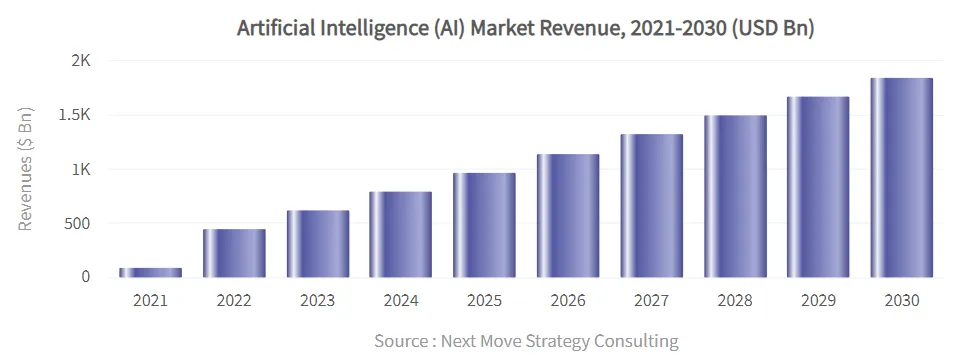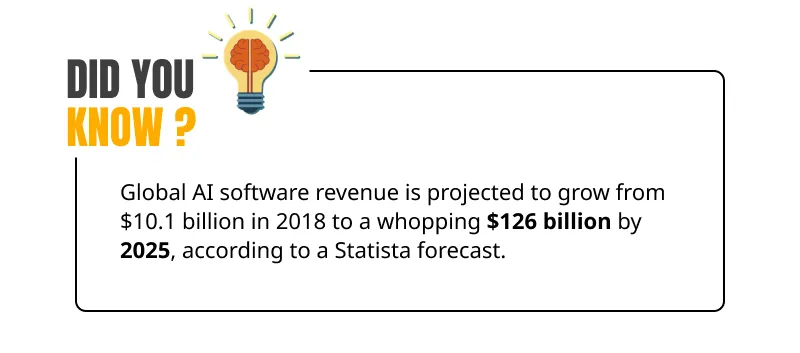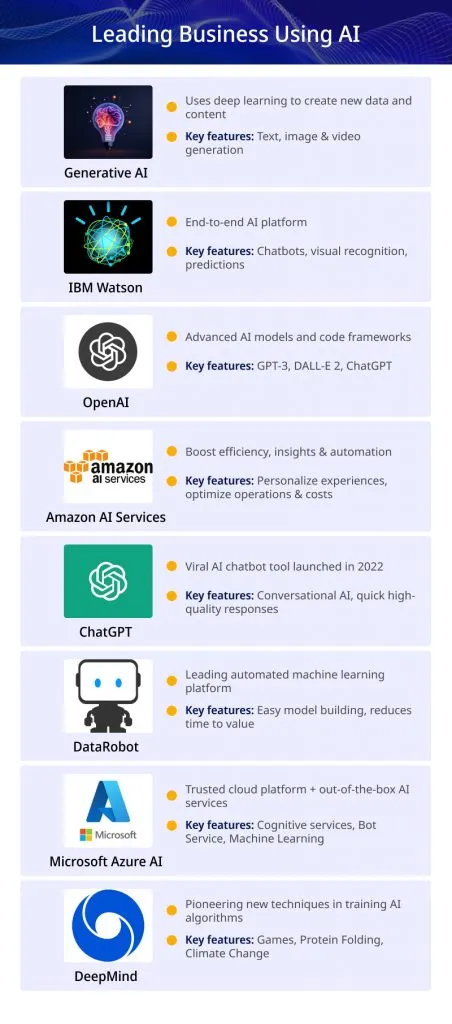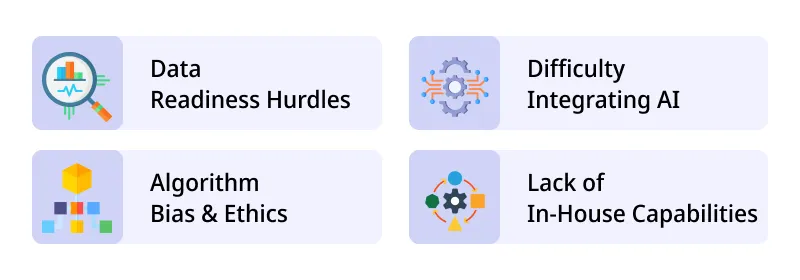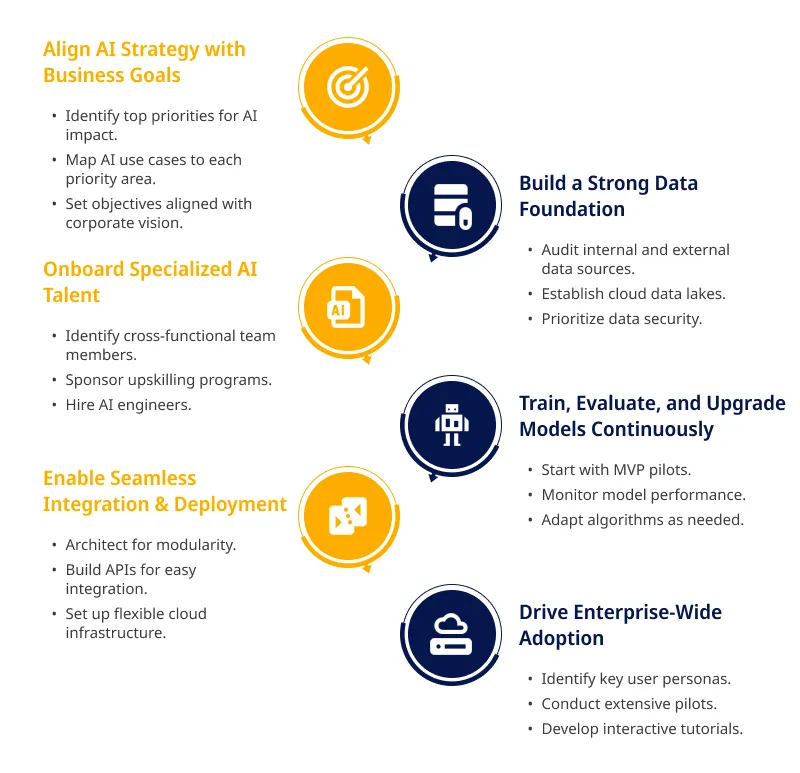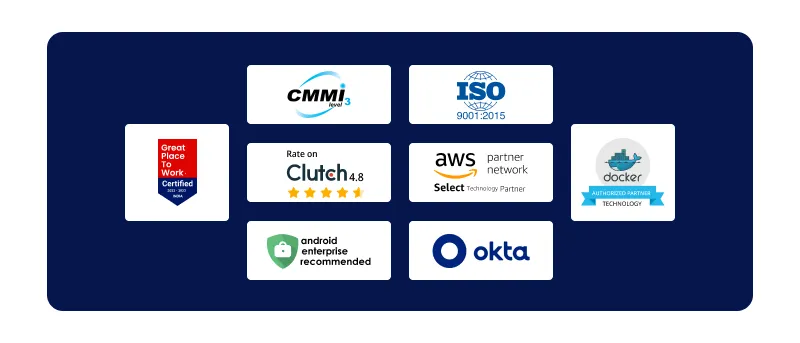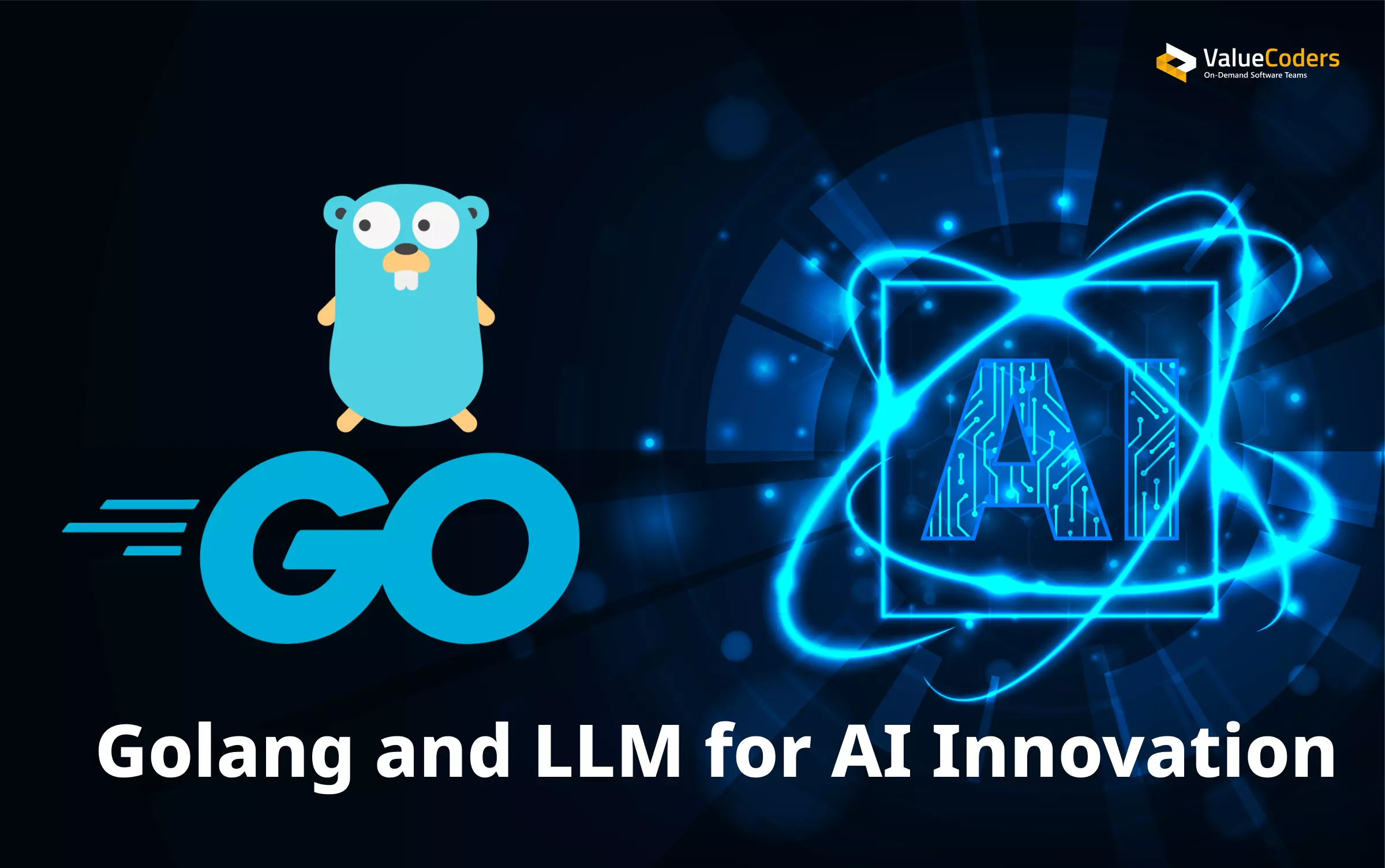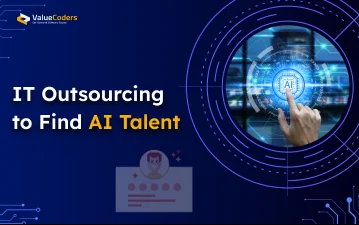“It’s hard to overstate how big of an impact AI and machine learning will have on society over the next 20 years.” – Jeff Bezos
Next Move Strategy Consulting predicts that the Artificial Intelligence (AI) market will experience significant growth over the next decade. With a recent value of nearly $100 billion, it is projected to expand twentyfold by 2030, reaching almost $2 trillion.
The future of AI promises exciting innovations that could transform nearly every industry. As this technology continues its rapid development, many companies explore leveraging AI to enhance products, improve efficiency, and keep pace with the competition.
However, the world of AI also comes with complex challenges that demand careful consideration. Implementing AI requires strategic planning, data and computing resources access, recruiting skilled talent, and mitigating risks like algorithmic bias.
Let’s navigate the AI development landscape with insights based on our experience helping clients implement custom AI solutions. We will explore the most promising opportunities for applying AI and the obstacles that companies often encounter.
Organizations can design innovative strategies by understanding both AI’s tremendous potential and common pitfalls. With the proper knowledge and partners, companies can harness the power of AI to create substantial competitive advantages now and in the future.
ValueCoders provides end-to-end AI development services tailored to your growth needs - from ideation to deployment.
Understanding AI Development
The future of Artificial Intelligence promises tremendous growth and opportunities.
Source: Statista
The chart below illustrates the growth curve expected in the coming years.
Key factors fueling rapid AI development:
- Availability of massive data through IoT devices, social media, ecommerce, and more.
- Enhanced cloud computing infrastructure to support AI model building.
- Continuous advances in machine learning algorithms and techniques.
- Increasing business interest in investing in AI to boost efficiency.
A McKinsey report projected that AI could potentially deliver $13 trillion in additional global economic value by 2030. Industries across sectors, from healthcare to finance to agriculture, witness AI’s transformative potential.
Amidst these predictions, it’s evident that AI’s influence spans various sectors, with its transformative potential reaching across industries and driving economic growth on a global scale.
For companies looking to explore or expand AI initiatives, partnering with an Artificial Intelligence development company offering robust AI capabilities, deep domain expertise, and business acumen is key to long-term success.
Leading technology research firm Gartner predicts that Generative AI software spending will rise from 8% to 35% of AI software in 2023 to 2027.
The future of AI promises to be an era of technology-led disruption. Organizations strategically adopting AI solutions to transform customer engagement, operations, products, and services will be best positioned to lead in their industries.
Opportunities in AI Development
AI adoption is accelerating across industries, driven by significant opportunities.
According to IBM’s Global AI Adoption Index 2022, over 35% of companies have implemented AI in some functions.
The future of AI promises immense AI development opportunities across a range of areas:
1. Transform Customer Experiences
- Intelligent chatbots and virtual assistants enable personalized engagements.
- Predictive analytics proactively provide customized recommendations.
- Sentiment analysis evaluates feedback and intent.
- JP Morgan saw higher client interactions and efficiency with AI bots.
2. Optimize Operations
- Automate manual tasks using Robotic Process Automation.
- Prevent machine failures with predictive maintenance.
- Brex achieved near-zero fraud with real-time anomaly detection.
Also Read: How AI is Changing Software Testing Forever?
3. Innovate Offerings
- Create data-based products and services.
- Leverage computer vision and NLP for intelligent interfaces.
- Autonomous vehicles and VR demonstrate radical innovation.
4. Gain Competitive Advantage
- AI front-runners like BCG are likely to lead future profit share.
- Right tools like TensorFlow enable enterprise-wide scaling.
- AI confers enduring strategic differentiation.
Our AI solutions help you hyper-personalize engagement, predict needs, and automate interactions.
The possibilities abound for AI to help transform customer experiences, optimize operations, accelerate innovation, and confer competitive advantage. Some additional significant opportunities and benefits of AI development include:
- Enhanced Strategic Planning: AI can analyze massive amounts of structured and unstructured data to reveal connections and patterns for more informed decisions and planning.
- Better Recruitment and Hiring: AI-powered chatbots can screen candidates 24/7 and reduce recruiter workloads by up to 30%. Intelligent algorithms can objectively evaluate skills, personalities, and cultural fit to minimize hiring biases.
- Augmented Human Creativity: AI can help generate creative work for campaigns, product designs, music, and more to augment human imagination.
- Enhanced Cybersecurity: AI algorithms can quickly detect new malware, suspicious behavior, and other threats.
- Accelerated Medical Discoveries: AI can analyze connections between treatment chemicals, outcomes, and patient data to quicken lifesaving medical discoveries dramatically.
According to a BCG report, companies that establish themselves as leaders in AI technology will capture an outsized share of profits in their sectors.
To actualize the promise of AI, having the right tools and platforms is essential. Some top AI software development tools used by leading artificial intelligence development companies include TensorFlow, PyTorch, Keras, Microsoft Cognitive Services, Vision API, and more.
The future of artificial intelligence holds enormous potential for significant ROI. The time is now suitable for organizations to formulate bold AI strategies aligned to their business contexts.
Read more: Top AI Development Companies
AI Development Challenges
While the opportunities for innovation and transformation powered by AI seem limitless, developing enterprise-grade AI capabilities comes with a unique set of challenges that must be carefully navigated:
1. Data Readiness Hurdles
Many organizations struggle with fragmented data locked in silos and a lack of quality datasets required to train and validate AI models. Expert AI consulting services help firms assess data readiness and engineer features from existing resources. The right partner can also advise on acquiring additional high-value datasets if needed.
2. Difficulty Integrating AI
Seamlessly integrating predictive insights from AI needs strategic digitalization investments. Most companies grapple with legacy systems and on-premise hardware, which make deployment and scaling of AI applications tricky. The process necessitates upgraded IT infrastructure and the availability of specialized skill sets.
3. Algorithm Bias & Ethics
For certain use cases like recruitment, mapping, fraud detection, etc., algorithms can perpetrate inadvertent bias, leading to untrustworthy or unethical outcomes if not thoroughly validated. Continuously monitoring and upgrading models is critical to preventing discrimination. Partners with a strong generative AI development company that can architect inclusive AI.
4. Lack of In-House Capabilities
The AI talent crunch remains a top barrier, with a global shortage of over 300,000 machine learning engineers. Reskilling programs take time, and the required level of complex expertise spans multiple domains – from data science to DevOps to cloud architecture. Collaborating with expert AI partners allows quicker progress.
The future of AI requires establishing thoughtful guardrails regarding transparency, fairness, and accountability while leveraging AI’s promise. Organizations need robust governance frameworks and trustworthy partnerships that support rapidly evolving AI safely, responsibly, and sustainably.
Also Read: Artificial Intelligence in HR: Use Cases, Challenges & Solutions
Best Practices for Successful AI Development
Realizing AI’s full potential requires establishing a structured approach and robust processes centered around continuous experimentation and learning. Before jumping into AI development, dedicate time upfront to chart a strategic roadmap and build a flexible, data-driven infrastructure.
1. Execute an AI Strategy Aligned to Business Goals
Start by identifying your top 3-5 business priorities where AI could drive tangible impact – improving customer retention, reducing operational costs, accelerating research, or any other goal. Conduct an opportunity assessment to map relevant AI use cases to each priority area.
Also, evaluate your organizational readiness across data, infrastructure, and skill sets. Outline short and long-term objectives spanning ~18-24 months aligned to your overarching corporate vision.
2. Build an Enterprise Data Foundation
High-quality, organized data is the lifeblood of AI. Perform an audit of internal and external data sources to estimate the availability of datasets relevant to proposed models. Assess any gaps in data collection pipelines, workflows, and infrastructure that must be addressed. Modularize monolithic data stacks. Establish cloud data lakes and leverage tools like Apache Spark for easier preprocessing. Additionally, prioritize securing requisite volumes of labeled, unbiased data.
3. Onboard Specialized AI Talent
Identify cross-functional team members across the business, IT, analytics, design, etc., who will shepherd AI projects. Sponsor upskilling programs and create processes for expertise sharing. Hire AI engineers like data scientists, ML engineers, and MLOps architects either in-house or outsourced through a partner. Establish communities of practice to disseminate AI knowledge across the organization.
4. Continuously Train, Evaluate, and Upgrade Models
With the right talent and data foundation, you can begin building models. Start with MVP pilots focused on a narrowly defined use case that allows quick wins. Based on the problem statement, choose the most appropriate AI techniques like computer vision, NLP, reinforcement learning, etc. Rigorously monitor model performance across parameters like accuracy, explainability, computational efficiency, and drift to flag any degradation. Also, maintain flexibility to continuously retrain models by identifying new datasets and techniques to refine algorithms.
Our ethically aligned AI development practices focused on transparency, fairness, and governance safeguard your initiatives.
5. Enable Seamless Integration & Deployment
Models must be seamlessly integrated into applications and processes for sustained business impact. Architect for modularity with portable models using frameworks like ONNX. Build modular solutions with APIs to integrate model inferences and predictive intelligence into business workflows easily. Set up flexible cloud infrastructure that allows efficient model deployment, testing, and maintenance. Prioritize usability by providing customized interfaces and dashboards showing clear ROI linkage.
6. Drive Enterprise-Wide Adoption
Even the most powerful AI applications risk failing without an adoption strategy aligned with user needs. Identify critical user personas and decision workflows. Conduct extensive pilots, showcase benefits through real-time demos, and educate stakeholders at all levels. Develop interactive tutorials and online communities to spur bottom-up engagement. Moreover, continually incorporate user feedback to transform AI solutions into trusted business partners rather than black-box tools.
The promise of AI lies in continuous experimentation, adaptation, and evolution in synch with market changes. For long-term returns, organizations must invest in specialized teams, infrastructure, and AI development companies & trends that support rapidly iterating on AI at the enterprise scale.
Also read: Top Machine Learning Development Companies
Let’s Talk About AI Development Numbers
The rapid maturation of AI and ML has led to soaring adoption across industries. The numbers speak volumes about the future of Artificial Intelligence here and now.
According to AuthorityHacker,
- 35% of businesses have adopted AI.
- AI is projected to boost the global economy by $15.7 trillion by 2030.
- AI advancements are forecasted to elevate banking industry revenue by $1 billion in the next three years.
- 68% of healthcare organizations utilize AI technologies.
- Google employs global AI technologies to handle 6.9 billion daily search queries.
- The wearable AI market is anticipated to achieve a value of $180 billion by 2025.
Other relevant statistics include:
- 80% of emerging technologies driving future economic impact have AI foundations
- AI could contribute $15.7 trillion to global GDP by 2030.
- Top adopted AI use cases:
- 26% Computer Vision
- 22% Natural Language Processing
- By 2025, NLP deployments will surpass computer vision
The numbers point to massive growth in AI software and solutions to transform every economic sector. With the AI talent shortage a pressing challenge, collaborating with an experienced AI services partner provides much-needed capabilities for scaling impact.
How We Helped Our Clients
As leaders in AI development with over a decade of experience, we have enabled both large enterprises and growth-stage companies to accelerate innovation and transform customer value propositions leveraging artificial intelligence.
➡️ Global Media Conglomerate
When a reputed media conglomerate wanted to modernize its legacy pay-TV recommendation engines, it partnered with us to develop high-precision content-based filtering algorithms.
By leveraging predictive user preferences and multivariate testing, we helped enhance channel selection relevance by 46%. Adoption across millions of set-top boxes demonstrated how AI is transforming content discovery.
➡️ Ecommerce Marketplace
A rapidly growing Asia-based ecommerce firm collaborated with our AI & ML developers in India to architect a real-time product recommendation system. The AI engine optimized suggestions by processing signals from browsing patterns, transaction history, and supply chain constraints, leading to an 11% increase in order sizes.
➡️ Autonomous Vehicles Startup
Our computer vision and sensor fusion capabilities supported an autonomous vehicles startup focused on long-haul trucking logistics to build robust navigation systems resilient across seasons and terrains.
By leveraging geospatial data and simulated environments, our Artificial Intelligence developers in India enabled the startup to secure crucial funding.
These examples demonstrate our proven track record in delivering customer success and ROI across AI development projects from personalization to disruption.
Read more: AI-Powered Future: Revolutionizing Businesses with Tools
What Do Numbers Say About Us?
As one of the world’s leading AI development partners, our growth has outpaced the industry each year. Our numbers and clientele showcase our strengths.
✓ 4200+ AI projects delivered
✓ 500+ ML models built
✓ 675+ full-time staff
✓ 97% Client retention rate
✓ 2500+ Global clients
✓ 2000+ Man years experience
Our numbers testify to our specialized expertise across the AI value chain, spanning data engineering, MLOps, and app development. Over a decade of experience, coupled with our vast talent pool of subject matter experts, gives us an edge in technical capabilities.
With 4200+ models built and 97% client retention, ValueCoders has the credentials and expertise to ensure your AI success.
Recognition & Rewards
We are proud to be consistently recognized for excellence in AI development across leading industry platforms.
Our work has also been featured among the best in artificial intelligence coding on peer forums like GoodFirms. Our teams feel motivated to keep raising the bar when it comes to delivering complex AI projects with reliability.
Closing Thoughts
The future of AI is full of exciting opportunities to transform businesses through intelligent automation, deeper insights, and hyper-personalization.
However, realizing the strategic potential of AI necessitates navigating unique challenges around integration complexities, algorithmic transparency, data readiness, and specialized talent.
Through this whitepaper, we have shared best practices and recommendations on how to build an enterprise AI roadmap aligned to clearly defined business priorities.
We have also provided actionable perspectives on responsibly accelerating AI adoption by leveraging robust data strategies, trustworthy partnerships, and continuous governance.
As an established AI development leader with a decade of experience across innovative implementations, ValueCoders is ready to support your AI journey today and in the future.
Contact our experts to start a conversation around your most pressing AI needs. Together, let us unlock AI’s possibilities to create a lasting competitive advantage for your organization.
Artificial intelligence is transforming the world – now is the time to boldly invest in an AI-powered tomorrow.


